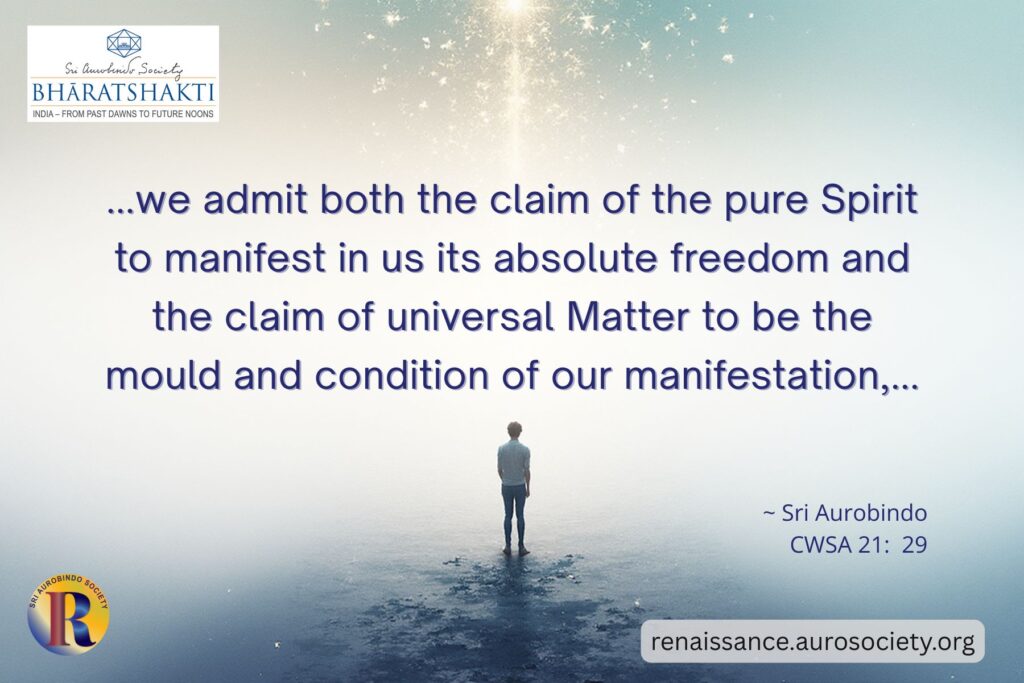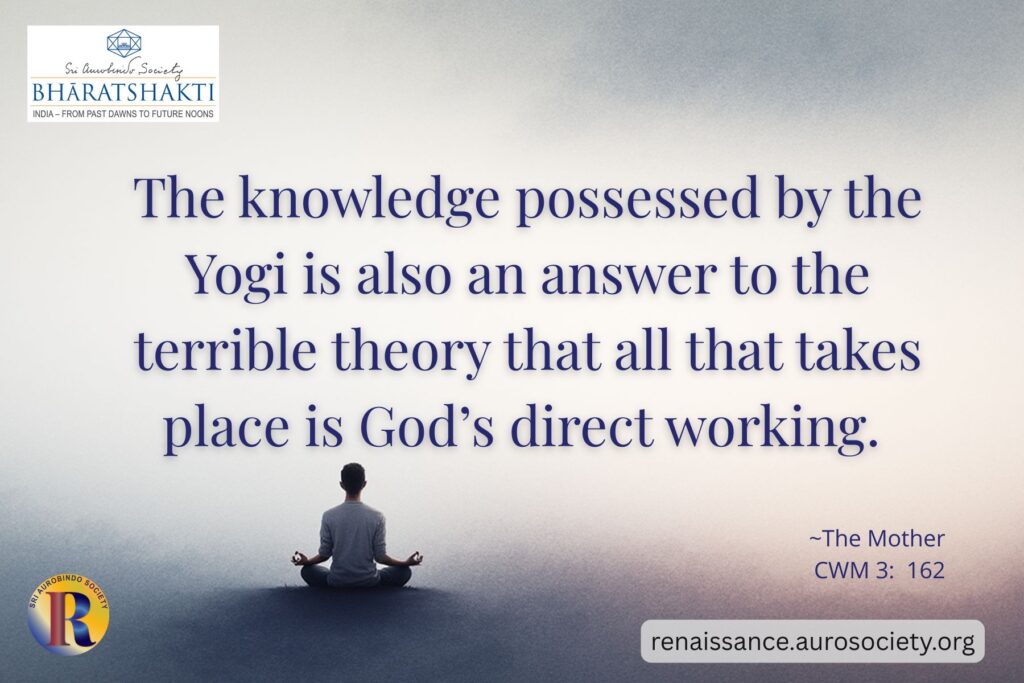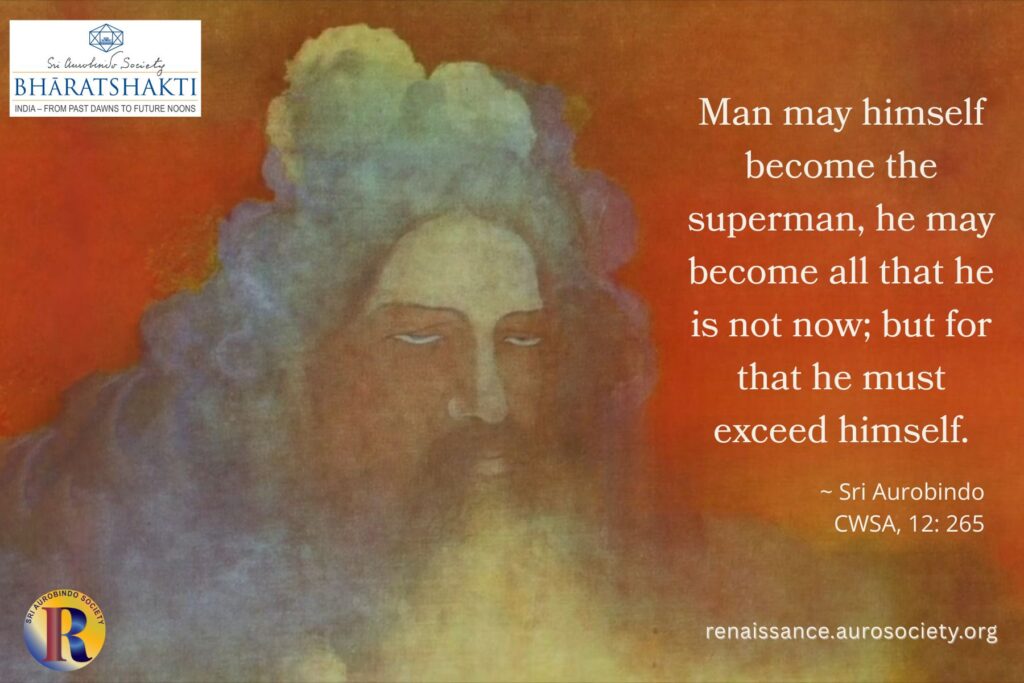Volume III, Issue 2
Author: Sri Aurobindo and the Mother
Editor’s note: As an offering on the Mother’s 144th birthday, we focus here on the Mahakali aspect of the Divine Mother. With the attribute ‘Progress’ as our theme, we were reminded of a particular letter of Sri Aurobindo in which he tells a disciple that “those who want to progress quickly, welcome even the blows of Mahakali because that pushes them more rapidly on the way” (CWSA, Vol. 32, p. 353). Highlighting this aspect of the Mother seemed a perfect choice for this issue.
We present here a few selections from Sri Aurobindo and the Mother. For the ease of online readability, a few headings are added and paragraphs have been shortened. No text has been altered in any way. To close this feature, we invoke the first Charita from the Devi Māhātmya as summarised by T. V. Kapali Sastri.

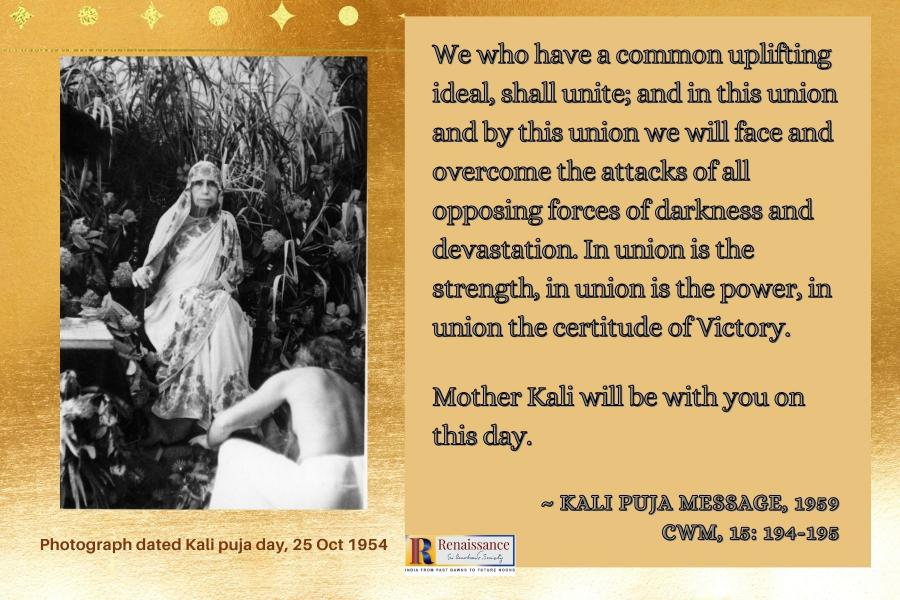

Four Great Aspects of the Mother: Words of Sri Aurobindo
The Mother not only governs all from above but she descends into this lesser triple universe. Impersonally, all things here, even the movements of the Ignorance, are herself in veiled power and her creations in diminished substance, her Nature-body and Nature-force, and they exist because, moved by the mysterious fiat of the Supreme to work out something that was there in the possibilities of the Infinite, she has consented to the great sacrifice and has put on like a mask the soul and forms of the Ignorance.
But personally too she has stooped to descend here into the Darkness that she may lead it to the Light, into the Falsehood and Error that she may convert it to the Truth, into this Death that she may turn it to godlike Life, into this world-pain and its obstinate sorrow and suffering that she may end it in the transforming ecstasy of her sublime Ananda.
In her deep and great love for her children she has consented to put on herself the cloak of this obscurity, condescended to bear the attacks and torturing influences of the powers of the Darkness and the Falsehood, borne to pass through the portals of the birth that is a death, taken upon herself the pangs and sorrows and sufferings of the creation, since it seemed that thus alone could it be lifted to the Light and Joy and Truth and eternal Life.
This is the great sacrifice called sometimes the sacrifice of the Purusha, but much more deeply the holocaust of Prakriti, the sacrifice of the Divine Mother.
Also see:
The Mahashakti and Her Powers
Four great Aspects of the Mother, four of her leading Powers and Personalities have stood in front in her guidance of this universe and in her dealings with the terrestrial play.
One is her personality of calm wideness and comprehending wisdom and tranquil benignity and inexhaustible compassion and sovereign and surpassing majesty and all-ruling greatness. Another embodies her power of splendid strength and irresistible passion, her warrior mood, her overwhelming will, her impetuous swiftness and world-shaking force.
A third is vivid and sweet and wonderful with her deep secret of beauty and harmony and fine rhythm, her intricate and subtle opulence, her compelling attraction and captivating grace. The fourth is equipped with her close and profound capacity of intimate knowledge and careful flawless work and quiet and exact perfection in all things.
Wisdom, Strength, Harmony, Perfection are their several attributes and it is these powers that they bring with them into the world, manifest in a human disguise in their Vibhutis and shall found in the divine degree of their ascension in those who can open their earthly nature to the direct and living influence of the Mother. To the four we give the four great names, Maheshwari, Mahakali, Mahalakshmi, Mahasaraswati. [. . .]
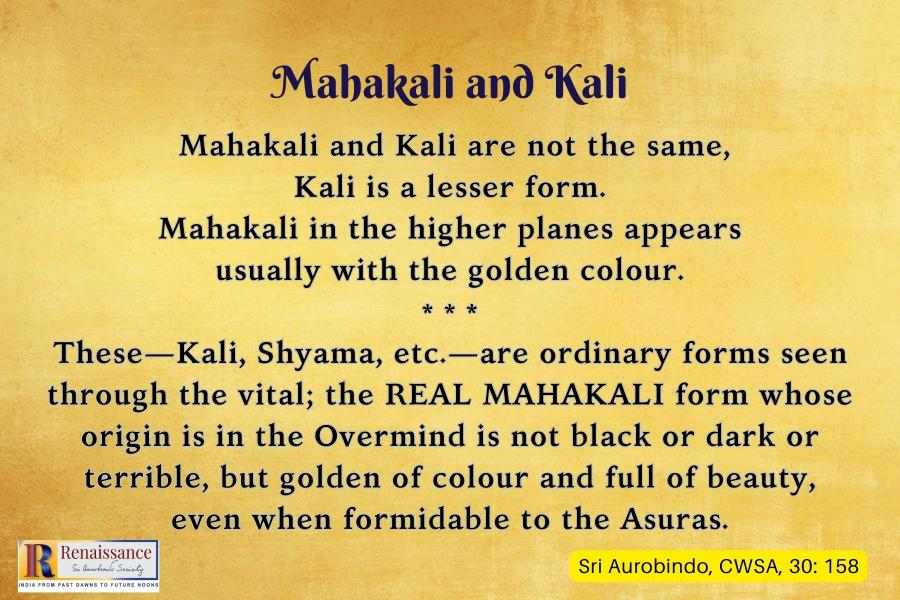
Mahakali
. . . Not wideness but height, not wisdom but force and strength are her peculiar power. There is in her an overwhelming intensity, a mighty passion of force to achieve, a divine violence rushing to shatter every limit and obstacle. All her divinity leaps out in a splendour of tempestuous action; she is there for swiftness, for the immediately effective process, the rapid and direct stroke, the frontal assault that carries everything before it.
Terrible is her face to the Asura, dangerous and ruthless her mood against the haters of the Divine; for she is the Warrior of the Worlds who never shrinks from the battle.
Intolerant of imperfection, she deals roughly with all in man that is unwilling and she is severe to all that is obstinately ignorant and obscure; her wrath is immediate and dire against treachery and falsehood and malignity, ill-will is smitten at once by her scourge. Indifference, negligence and sloth in the divine work she cannot bear and she smites awake at once with sharp pain, if need be, the untimely slumberer and the loiterer.
Her Love as Intense as Her Wrath
The impulses that are swift and straight and frank, the movements that are unreserved and absolute, the aspiration that mounts in flame are the motion of Mahakali. Her spirit is tameless, her vision and will are high and far-reaching like the flight of an eagle, her feet are rapid on the upward way and her hands are outstretched to strike and to succour.
For she too is the Mother and her love is as intense as her wrath and she has a deep and passionate kindness. When she is allowed to intervene in her strength, then in one moment are broken like things without consistence the obstacles that immobilise or the enemies that assail the seeker.
If her anger is dreadful to the hostile and the vehemence of her pressure painful to the weak and timid, she is loved and worshipped by the great, the strong and the noble; for they feel that her blows beat what is rebellious in their material into strength and perfect truth, hammer straight what is wry and perverse and expel what is impure or defective.
But for her what is done in a day might have taken centuries; without her Ananda might be wide and grave or soft and sweet and beautiful but would lose the flaming joy of its most absolute intensities.
To knowledge she gives a conquering might, brings to beauty and harmony a high and mounting movement and imparts to the slow and difficult labour after perfection an impetus that multiplies the power and shortens the long way. Nothing can satisfy her that falls short of the supreme ecstasies, the highest heights, the noblest aims, the largest vistas. Therefore with her is the victorious force of the Divine and it is by grace of her fire and passion and speed if the great achievement can be done now rather than hereafter.
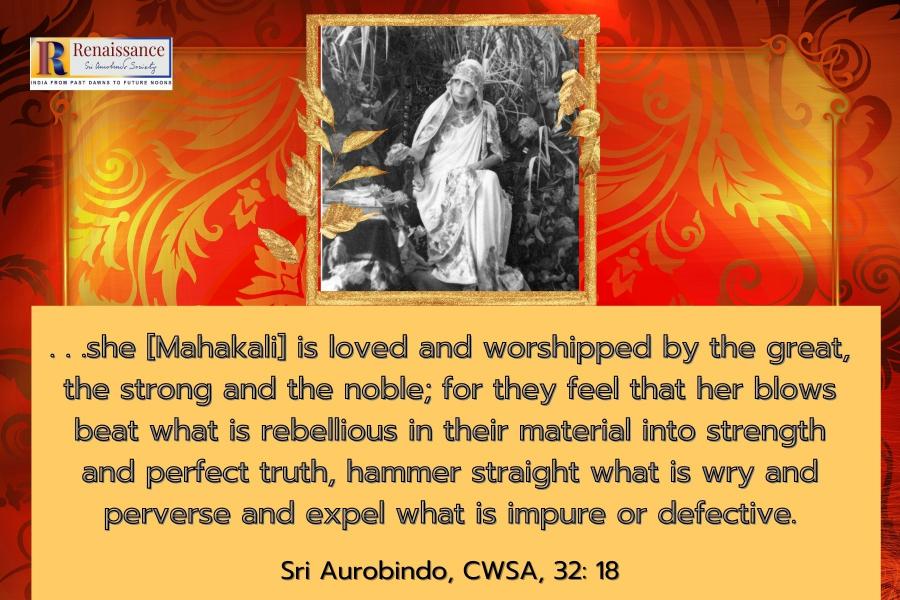
The Mahakali Method
The Mother uses the method you speak of, the Mahakali method, (1) with those in whom there is a great eagerness to progress and a fundamental sincerity somewhere even in the vital, (2) with those whom she meets intimately and who, she knows, will not resent or misunderstand her severity or take it for a withdrawal of kindness or grace but will regard it as a true grace and a help to their sadhana.
There are others who cannot bear this method—if it was continued they would run a thousand miles away in misunderstanding, revolt and despair. What the Mother wants is for people to have their full chance for their souls, be the method short and swift or long and tortuous. Each she must treat according to his nature.
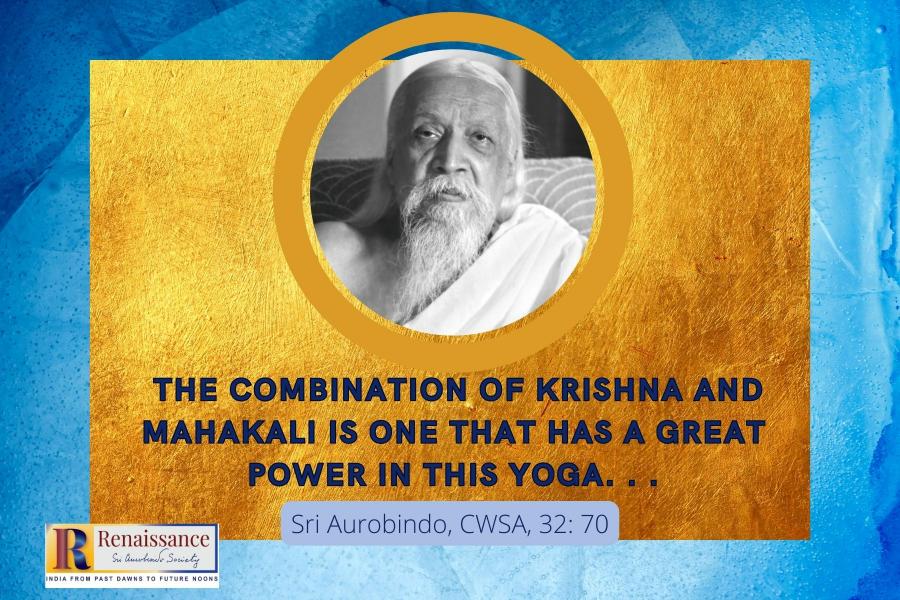
Blows of Mahakali as Blessing
Disciple: Is it true that when I realise the Divine Consciousness there will be no difference between the Mother’s will and mine? I would like her to tell me whatever her will is, even if it is unpalatable to me—not to say “If you like” or “As you like”, but to say “Do this” or “Do not do this.”
Certainly, when the Divine Consciousness is fully realised, there will be no difference between the Mother’s will and the sadhaka’s.
For a relation to exist in which Mother can do as you say, the sadhak must not be afraid of the Mahakali aspect and ask only for sweetness. He must be able to take the blows of Mahakali as a blessing. He must also believe in her vision and judgment and word, otherwise when she says or does something unpleasant to his ego that ego will go sulking, justifying itself, calling her names etc. as is the habit with so many in the Asram when she does not do what they like.
There are very few here who can take this attitude even imperfectly, but it is with them that the Mother has this relation. With others, who have a different nature, she cannot but behave differently—for she has to act with each according to his nature.
The Mahakali Force
Disciple: About the Mother’s Mahakali aspect it is said in The Mother: “When she is allowed to intervene in her strength, then in one moment are broken like things without consistence the obstacles that immobilise or the enemies that assail the seeker.” How is this intervention of the Mahakali force felt?
It is felt as if something swift, sudden, decisive and imperative. When it intervenes, it has a kind of divine or supramental sanction behind it and is like a fiat against which there is no appeal. What is done cannot be reversed or undone. The adverse forces may try, may even touch or invade, but they retire baffled and it is seen as soon as they withdraw that the past ground has remained intact—it is felt even in the attack.
Also the difficulties that were strong before touched by this fiat lose their power, their verisimilitude destroyed or are weak shadows that come only to flicker and fade away. I say “allowed”, because this supreme action of Mahakali is comparatively rare, the action of the other Powers or a partial action of Mahakali is more common.

Kali, Love and Progress: Words of the Mother
Kali rarely acts in the mind. In the higher domains she is a power of love which pushes towards progress and transformation; in the vital she is a power of destruction of falsehood, hypocrisy and ill-will.
All that is good, truthful and progressive is never destroyed by her. On the contrary, she protects and sustains it.
Behind all destructions, whether the immense destructions of Nature, earthquakes, volcanic eruptions, cyclones, floods, etc., or the violent human destructions, wars, revolutions, revolts, I find the power of Kali, who is working in the earth-atmosphere to hasten the progress of transformation.
All that is not only divine in essence but also divine in realisation is by its very nature above these destructions and cannot be touched by them. Thus the extent of the disaster gives the measure of the imperfection.
The true way of preventing the repetition of these destructions is to learn their lesson and make the necessary progress.
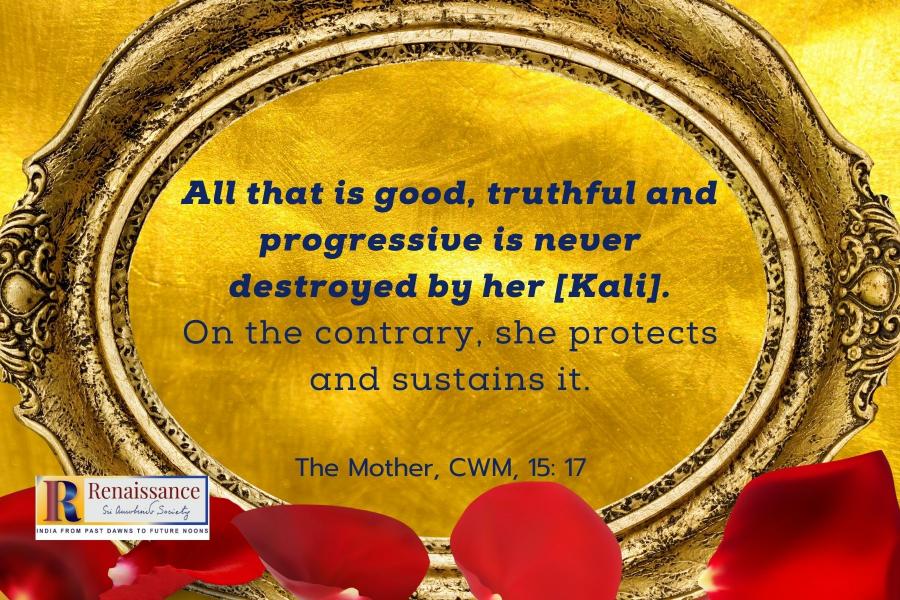
Images of Kali
Disciple: Are the stories told about the image of Mahakali true?
What stories? Hundreds of stories are told, my child. Which stories are you speaking of? Which Mahakali? The images made of her, the statues? This is the human way of seeing things. She is not like that.
I believe I have already told you once that there are the original beings in their higher reality and these are of a particular kind; then, as they manifest in more and more material regions, nearer and nearer the earth, they assume different forms and also multiply in a strange way. If you like, the beings Sri Aurobindo speaks of here belong to regions quite close to the Supermind, they are still in quite a clear and conscious contact with the supramental origin.
These beings manifest also in what Sri Aurobindo calls the Overmind and there the form becomes as it were more marked, a little more precise and at the same time reduced in power and capacity. Then, from the Overmind they come down into the human mind, the terrestrial mind and there. . .
Take for instance this poor Mahakali; you have a multitude of Kalis, one more horrible than another; some are absolutely terrifying and horrifying, and they sometimes become quite repulsive beings who are exclusively human formations, that is, the outer form is given by human imagination, by the human mind’s capacity of formation. There may be within that a vague reflection of the force of Mahakali, but it is so diminished, deformed, dwarfed, brought within the range of human consciousness, that truly she can very well deny that it is she!
I have seen all possible horrors by way of images representing Mahakali. Of the images we won’t speak. If great artists have made them perhaps some beauty is still left, but as they are generally daubers, nothing remains.
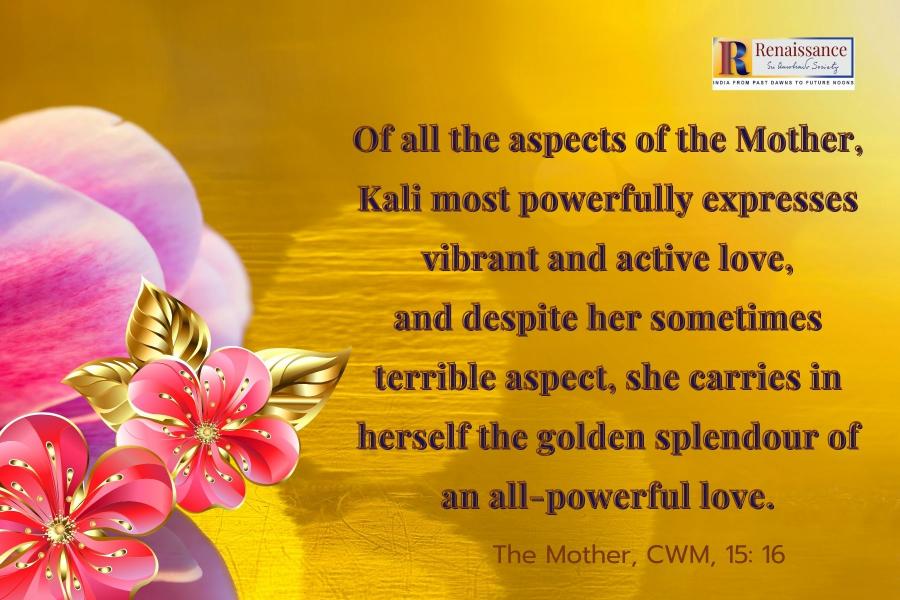
For more offerings on the Divine Mother, click HERE
As for the images (statues or pictures) which have to be installed in a temple, a religious ceremony is performed, and if the priest or the assistant is a man with occult powers, even limited ones, he can, with his aspiration and through the ritual, bring a supraterrestrial consciousness into these forms. That is the principle; you are told, “This is not a piece of wood, this is not a stone, this is not a picture; there is within it a force which the religious ritual has brought down and to this you may speak.”
This is right, but the nature of the priest must be known, his occult knowledge and also the forces with which he has an affinity. So, there may be many things in there. . . There is “something” (unless it is a stupid ignoramus who has performed the ceremony, one who has no power at all, has brought down nothing, made only a show—but this is rather rare; I can’t say it happens frequently, it is quite rare), generally there is something, but then the nature, the quality of this something, you know . . this varies infinitely and it is sometimes a little disturbing.
I gave the example of Mahakali, because the conception of Mahakali in the human consciousness is especially horrible. When one goes to other divinities like Mahasaraswati, for instance, to whom all kinds of artistic, literary and other capacities are ascribed, it is no longer so terrible.
But Mahakali particularly. . . Their conception of power, force, warlike energy is so terrible that what they bring down is indeed a little dangerous for those who worship it. I have heard innumerable stories since my coming to India.
I have been put in touch with innumerable images and have known many people who had in their homes a Kali they worshipped and to whom, sometimes, quite dreadful things had happened. I always put them on their guard, I told them, “Don’t think at all that Mahakali is responsible for your misfortunes, for she is not responsible for them.
But it is likely that the Kali you have in your home must be harbouring some vindictive being, probably one very jealous, extremely wilful and with a very strong spirit of vengeance, and as you have faith and as it is generally a vital power, there may be truly dangerous consequences.”
I have known people who, after having had all kinds of unfortunate experiences, have taken the statue of Mahakali and thrown it into the Ganges. If at the same time they could acquire a certain freedom of spirit, all the damage would disappear, but some of them are so frightened of what they have done that the bad effects continue.
These things should never be touched unless one has at least the first elements of occult knowledge.
Unfortunately, in religions—all religions, not only here but everywhere—knowledge is never given to the faithful. Sometimes the priests have it (I don’t say always), but when they have it they take good care not to give it to the faithful, for that would deprive them of their authority and power, and that really is the evil behind all religious institutions.
[. . .] In the earth atmosphere there is indeed a Kali who deals with earthly things and is somewhat, one cannot say independent, yet not quite the expression of Mahakali; but she is altogether obedient to her and has her major qualities. They are diminished in power and efficacy, but they exist, and the beauty of her nature is there.
Perhaps some of you have had relations with that Mahakali. She does not avenge herself, she never does harm to those who love her, she does not strike with epidemics the countries which do not show her sufficient respect and consideration. But she likes violence, she likes war and her justice is crushing.

From the Devi Māhātmya
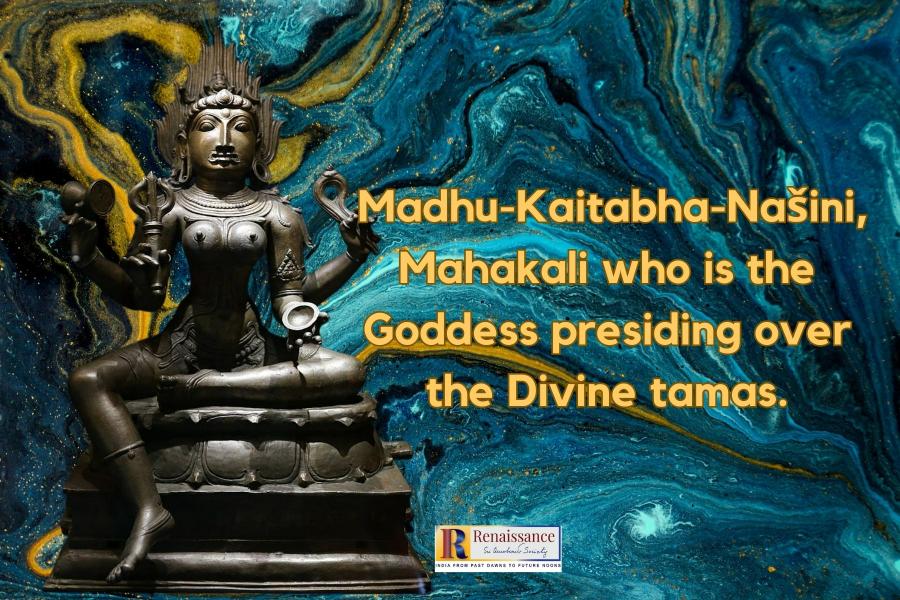
Though She is eternal, immanent in the whole universe which is Her embodiment, She takes birth again and again, incarnates Herself in a special form of Her choice for the successful regime of the Gods, Devas — for establishing Divine Principles in the world-order so that its functionings may increasingly harmonise with the eternal verities and higher laws of the creative Godhead.
At the close of a former cycle when the cosmos was asleep in the Oceanic Being of its own Cause, and Vishnu, the Lord, also was in his supra-cosmic sleep, yoga-nidrā, two Asuras, Madhu and Kaitabha were born of the ear-dirt of the Lord and tried to kill Brahma, the creator residing in the navel-lotus of Hari. Upon this, Brahma sought the grace of the goddess of Sleep lodged in the Lord’s eyes and sang the praises of the Devi.
In response, Mahakali, the terrible ruler of the Night, the pitch Dark, tamasi rātri, granted Brahma’s prayer in rousing Vishnu from the sleep and caused the destruction of the two Asuras: this is how she came to be titled Madhu-Kaitabha-Našini. Thus ends the first Charita, the story of Mahakali who is the Goddess presiding over the Divine tamas.
~ T. V. Kapali Sastry, Collected Works, Vol. 1, Devi Puja

~ Design: Beloo Mehra

